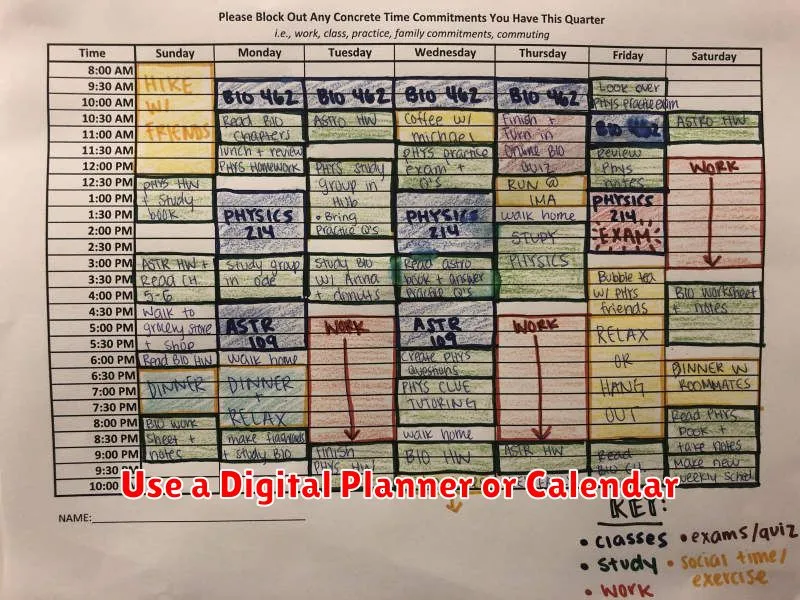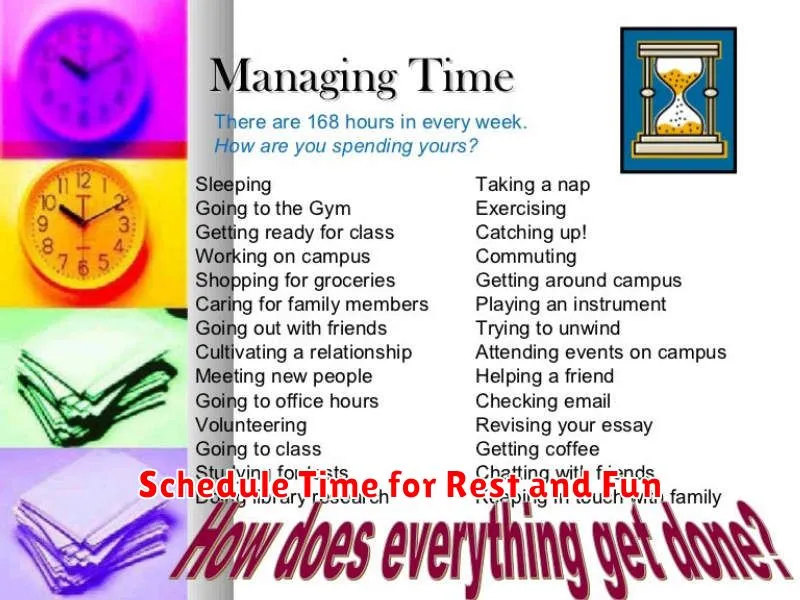University life presents a unique challenge: balancing academics, extracurricular activities, social life, and personal well-being. Creating a balanced schedule is crucial for academic success, stress management, and overall enjoyment of this formative period. This article will provide practical strategies and actionable tips for developing a personalized schedule that allows you to effectively manage your time and thrive in the demanding university environment. Learning how to prioritize tasks, allocate time effectively, and maintain flexibility are key components of a successful university experience.
Juggling demanding coursework, engaging extracurriculars, a vibrant social scene, and essential self-care can feel overwhelming. Finding the right balance is key to not only surviving but also thriving in university. This guide will equip you with the tools and techniques to create a balanced schedule that supports your academic goals, fosters personal growth, and enables you to make the most of your university years. From time management techniques to effective planning strategies, you will learn how to design a schedule that maximizes your productivity and minimizes stress. Mastering the art of schedule creation is a fundamental skill for navigating the complexities of university life.
Identify Priorities and Time Commitments
A crucial step in creating a balanced university schedule involves identifying your priorities and the time commitments associated with them. Academic success should generally be the top priority. This includes attending classes, completing assignments, studying for exams, and participating in research or other academic activities.
Beyond academics, consider other important commitments. These might include extracurricular activities, part-time jobs, family obligations, and personal well-being activities like exercise and socializing. Realistically assess the time required for each commitment. Be honest with yourself about how much time you can dedicate to each activity without feeling overwhelmed.
Creating a list or a table can be a helpful visual tool. List each commitment and estimate the weekly hours required. This will provide a clearer picture of how your time is currently allocated and where adjustments might be needed. Remember to factor in travel time, meal times, and necessary downtime for relaxation and sleep.
Use a Digital Planner or Calendar

Managing your time effectively in university requires a reliable system. A digital planner or calendar offers a centralized hub for organizing your academic and personal life. These tools provide features beyond simple date tracking. You can set reminders for deadlines, schedule study sessions, and allocate time for extracurricular activities. This helps prevent overlooking important tasks and promotes a more structured approach to your daily and weekly schedule.
Digital calendars offer flexibility. Easily reschedule events if conflicts arise, and set recurring tasks for regular commitments like classes or club meetings. The accessibility of these tools is a key benefit. Access your schedule from your phone, tablet, or computer, keeping you organized wherever you are. Many digital calendars also integrate with other apps, further streamlining your workflow.
Avoid Overcommitting to Activities
University life presents a plethora of opportunities, from clubs and organizations to research projects and social events. It’s easy to get caught up in the excitement and overcommit to more activities than you can realistically handle. Prioritize your involvement. Carefully consider which activities genuinely align with your interests, goals, and available time.
Realistically assess your workload. Academic demands should always be your primary focus. Factor in the time required for classes, studying, assignments, and exams before committing to extracurricular activities. Create a weekly schedule to visualize your commitments and identify potential conflicts.
Learn to say no. It’s okay to decline invitations or opportunities if you feel overwhelmed or stretched too thin. Focus your energy on a few key activities where you can make a meaningful contribution rather than spreading yourself too thinly across numerous commitments.
Regularly evaluate your involvement. As the semester progresses, your priorities and available time may shift. Don’t be afraid to step back from an activity if it’s no longer serving you or if it’s negatively impacting your academic performance or well-being.
Schedule Time for Rest and Fun

Amidst the academic rigor of university life, scheduling time for rest and fun is not a luxury, but a necessity. It’s easy to get caught up in the cycle of classes, studying, and extracurricular activities, leaving little room for personal time. However, neglecting downtime can lead to burnout, decreased productivity, and a decline in overall well-being.
Prioritize relaxation and leisure activities just as you would any other important commitment. Block out specific times in your schedule dedicated to activities you enjoy. This could include anything from reading, listening to music, spending time with friends, pursuing hobbies, or simply relaxing.
Regular breaks, even short ones, can significantly improve focus and concentration. Consider incorporating short breaks between study sessions to recharge and avoid mental fatigue. Even a 15-minute break can make a world of difference.
Ensure you are getting enough sleep. A well-rested mind is crucial for academic success. Aim for 7-8 hours of quality sleep each night to support optimal cognitive function and overall health.
Set Realistic Academic Goals
Setting realistic academic goals is crucial for success and maintaining a healthy balance in university. Unrealistic expectations can lead to burnout, stress, and ultimately hinder your academic performance.
Start by honestly assessing your current skills and available time. Consider your course load, extracurricular activities, and personal commitments. Avoid overestimating your capacity, especially at the beginning of a new term.
Break down larger goals into smaller, more manageable steps. Instead of aiming for a perfect score on a midterm, focus on mastering individual concepts or chapters each week. This approach allows you to track progress and make adjustments as needed.
Prioritize your tasks. Identify the most important assignments and dedicate sufficient time to complete them effectively. Use a planner or calendar to schedule study sessions and deadlines, ensuring you allocate time for both academic and personal activities.
Keep Regular Study Hours

Establishing a consistent study routine is crucial for academic success in university. Treat your studies like a job, allocating specific blocks of time each day dedicated solely to academic pursuits.
This helps develop strong study habits and reduces procrastination. While the number of hours needed will vary depending on your courses and individual learning style, consistency is key. A regular schedule trains your brain to focus during those allocated periods, enhancing your learning efficiency.
Consider creating a weekly timetable outlining your study hours. This provides a visual overview and helps you integrate studying seamlessly into your broader university schedule. Be realistic about your capacity and incorporate breaks into your study periods to maintain focus and avoid burnout.
Adjust Plans When Needed
University life is rarely predictable. Unexpected events, from a surprise quiz to a sudden illness, can disrupt even the most meticulously planned schedule. Therefore, flexibility is essential. Be prepared to adjust your plans when needed.
This might involve rescheduling study sessions, shifting assignment deadlines (if permitted by the instructor), or temporarily reducing your extracurricular commitments. Don’t be afraid to prioritize tasks and ask for help when overwhelmed. Regularly reviewing and revising your schedule is crucial for maintaining balance and staying on track.
Consider using a planner or digital calendar that allows for easy modifications. This can help you visualize your commitments and make adjustments efficiently. Remember, a balanced schedule is not a static entity; it’s a dynamic tool that should adapt to your evolving needs and circumstances.

